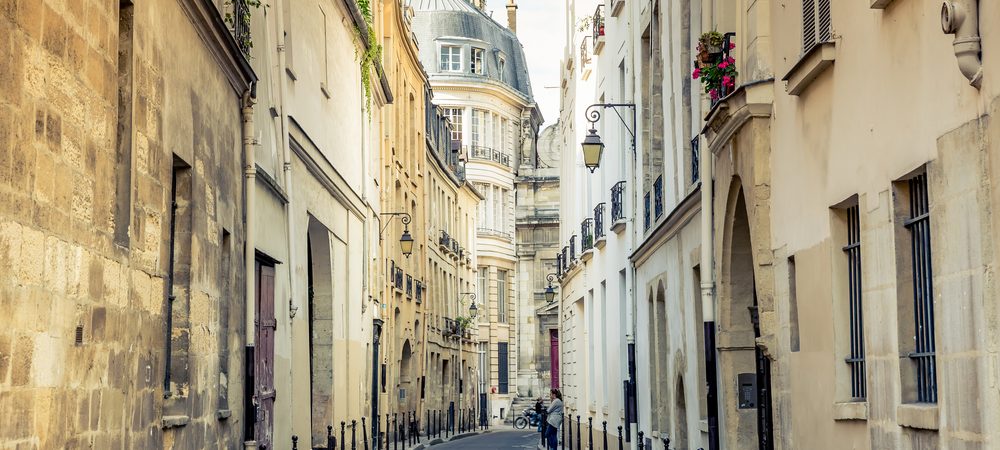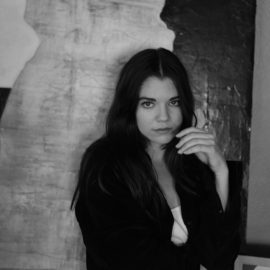Degustation

I’m at the edge of a dance floor standing next to the Russian boy. He brushes his fingertips against my back, and I laugh and nod as he talks, laughter as a replacement for words. I move onto the dance floor and he watches, his eyes tracing the curves of my arms as I raise them over my head in time with the music. I wonder if like him or I just like that he likes me. As I dance, a man comes up to me and places a pair of plastic devil horns on my head and whispers into my ear from behind. His breath is humid and I reach up to wipe the side of my face. I dance backward to get a look at him. His hair is greasy but his clothes are tailored. I know the type, men who think money makes up for hygiene. I’ve yet to meet a man who doesn’t have a facet of his personality that has to be made up for. I say merci and it’s clear from his eyes that I have not responded correctly. I smile and wave as I spin away into the circle of American girls with American hair that’s been blown out or curled for the night. When we finally walk home from the bar, I stop a woman on the corner and ask her how to say anti-Christ in French. Eyeing my devil horns she shrugs and says, anti-Christ, in a French accent. Everyone thinks that’s funny.
From the balcony of my apartment, I can see a woman sitting in a stairwell next to an eyeglass store. She is wearing a down jacket over black tights. Most days she is there, smoking and reading and waiting for the men she leads up the staircase but never back down. They emerge alone, glancing both ways before stepping back onto the sidewalk as if crossing a particularly busy street. Some days her spot is occupied by a man with an out-of-tune accordion, others by kids with fake petitions, often by dead pigeons.
There are dead pigeons everywhere in this city. I watch a tall dog, fur like velvet rubbed backwards, lap at the coagulated blood on one’s neck. The dog’s owner talks to a friend, occupied. The black ties of her espadrilles curl up her calves so tightly the fat bulges out like cheese through a grater. Her hair is unbrushed. Her friend notices the dog, his eyes locking on the dull gray tongue turning red, but says nothing. When they part, the woman drags the velvet mutt behind her. Unaware, she lets it lick her fingers.
The Russian boy is named Alek. He wears a leather jacket over his tracksuit and drinks sparkling red wine and smokes Belomorkanals. They are papirosa, he says, easier to empty and pack with weed. He has a stack of them on his dresser. I am lying on his bed, propped up on my elbow, and he says he isn’t sure my position is sustainable and hands me a pillow. I want to laugh but don’t. He leans back into his desk chair and picks up his wine, which he says is his mother’s favorite. It’s from Italy. I tell him I like it because it’s dry. His face lights up. Yes, he says, I send my roommate to get me a bottle. He comes back with semi-sweet. I don’t drink that Gatorade shit. I wonder if cursing in a second language is a sign of mastery. We are silent and watching each other, and I’m conscious that discomfort in this situation is expected but strangely absent. He leans forward, shifting his weight to the edge of the chair, and rests his forearms on his knees. There’s a boyishness to his face when I focus on his eyes. They’re excited. It’s something you wouldn’t notice if you passed him on the street. I like the thought of describing him that way, the Russian boy with the excited eyes, and the neon sneakers. He wants to know what I’m smirking about. Pink Moscato, I lie. He’s confused. Have you had Pink Moscato? You would hate it, I tell him.
I live for the moment in my aunt’s flat on the top floor of a building in the 4th Arrondissement. Living alone is a temporary situation that seems to necessitate indulgence. I sing out loud to Françoise Hardy or France Gall, blathering in an accent appalling even to my own ears. I smoke in bed, eat rice crackers dipped in ice cream, drink white wine in the morning. I know which habits are bad ones. Never leaving your apartment is a bad one, my mom says over the phone through mouthfuls of scrambled egg. I tell her I do leave, I just haven’t been to that jardin yet. I mock her use of the French word but she doesn’t seem to notice. She says she’s not paying for me to galavant. I ask her what she’d like to call what I’m doing. She makes a case for Vitamin D and I tell her I have a balcony. She says she has a balcony. There’s a pause and I try to hear my father’s voice in the background over the working of her jaw. Your father says he texted you the address of a cafe? The one in that Woody Allen film. She swallows before telling my father that Woody Allen is canceled.
The first thing I’ve come to realize is that aimlessness takes effort. Purpose is not easily eschewed. I don’t do well with paradox, so instead I read Ernaux on a stationary bike that faces my balcony. She feels no shame in laying her youth bare, in admitting to indulgence in sunshine and sex without contraceptives, her Paris a wanton Shangri La long dead. Wearing only my bathrobe tied carelessly, or nothing, I peddle headlong to nowhere, checking the calorie counter between pages. I’m no longer worried if people can see in. I know they can, but the curtains are hotel-like and blacked out. Whenthey’re closed they make it too easy to forget the world. I keep them open so I can ride watching the reflection of my building warped in the tinted glass facade of the Fire Department across the street. It’s the only building that does not match the Hausmannian architecture of the area, and it feels somehow symbolic that it’s the building I have to look at.
The man I am talking to is forty years my senior and doesn’t seem to notice. He has coerced me into conversation by asking that I order him a glass of wine. I have only learned to say vin blanc but it is more than he can say. The man is wearing a green scarf loose over his blazer and speaks close and conspiratorially, brandishing his wine. He says he used to be a reporter for the Village Voice, says he was at Studio 54 the night Bianca rode in on a white horse. I ask him if he was in Paris between the wars and he blinks. I let him talk. He might be extractable, the kind to give without prompting—a dinner, a connection, a character trait. I can’t tell which, but his loafers look expensive. He has moved on to Valerie Solanas, who I’ve heard entirely too much about lately. Solanas, with her SCUM, her silver lamé, her third-time’s-a-charm bullet to Warhol’s lungs, is having a moment, like low-cut jeans. I cannot bring myself to like Solanas, whose radicalism feels regressive. I cannot bring myself to like radicalism, no matter how cool it would make me look. I know who Solanas is, I say. He cocks his head, impressed and gratified, and I feel nauseated, the giver of gratification unearned. I pull my lips tightly back over my teeth and feel sorry for myself. Sorry that I know who Solanas is, who Bianca is, sorry that I am gratified by the image of a white horse in a doomed nightclub like a harbinger and this man who might have seen it.
To read the rest of this story, please purchase a copy of Issue #19 or to make sure you never miss an issue of Story, subscribe to the magazine
